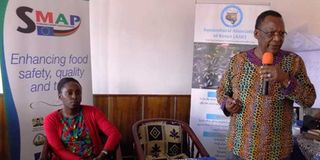Kenyan fish farmers urged to improve on quality, embrace global marketing

AAK national chairman Domiciano Maingi addresses participants during the training for fish farmers in Nakuru. Seated is UNIDO's Christine Misiko. PHOTO | RACHEL KIBUI | NATION MEDIA GROUP
What you need to know:
- Last week, fish farmers from five counties converged in Nakuru to strategize on securing the international market.
- SMAP is implemented through the United Nations Industrial Development Organisation.
- Domiciano Maingi urged players in the fish production chain to come together as a way of boosting quantity and quality.
- The export market is especially particular on chemical and mineral residues.
Fish farming is steadily gaining momentum in the country as focus now shifts to accessing international markets.
Last week, fish farmers from five counties converged in Nakuru to strategize on securing the international market.
The meeting is part of the European Union’s effort to boost Kenya’s export for both plant and animal products.
Under a programme dubbed Standards Market Access Programme (SMAP), EU has allocated Euro12.1 million (Sh1.26 billion) to various players in Kenya’s export industry in a bid to boost the sector.
SMAP is implemented through the United Nations Industrial Development Organisation (UNIDO).
Speaking during the closing of the three-day training, UNIDO official Christine Misiko said the country has a lot of opportunities for export both in Africa and other parts of the world if fish production is taken more seriously.

Charles Omuroka from Kakamega County (right) receives a certificate of participation from Nakuru County Agriculture Executive Stanly Chepkwony. PHOTO | RACHEL KIBUI | NATION MEDIA GROUP
DEMAND FOR FISH
“There is a lot of demand for fish as white meat is currently more preferred for its health benefits, and we must utilise the opportunity,” said Ms Misiko.
She asked Kenyans to move away from the traditional fish mongering to value addition by freezing, making fish sausages, fillets and other products.
Farmers must also open their eyes widely to the export market by familiarising themselves with the export requirements and available markets, she added.
“The more the varieties of our products, the wider the market and this will boost income from fish farming,” she added.
Aquaculture Association of Kenya (AAK) national chairman Domiciano Maingi urged players in the fish production chain to come together as a way of boosting quantity and quality.
“We need to come together so that we can set uniform prices for both local and international markets as opposed to operating informally,” he said.
Operating jointly, Maingi noted, farmers would be able to easily acquire machines that are required for value addition such as freezers.
The five counties which were represented in this training were Kiambu, Nakuru, Kajiado, Kisii and Kakamega.
This makes ten the total number of counties that have benefited from this training after five others were trained in Isiolo earlier in the month.
According to the fisheries department, fish production increased in the last 10 years from 1,035 metric tons in 2004 to 23,501 metric tons in 2013.
However, Senior Assistant Director of fisheries Daniel Mungai said farmers are often faced with challenges such as lack of exposure to markets and poor quality of fingerlings and feeds.
“We invite well-wishers such as the EU to work with the government in training interested players in aquaculture so that we can boost the sector economically and enhance food security,” said Mungai.

Fish farmers follow proceedings during the aquaculture training in Nakuru. PHOTO | RACHEL KIBUI | NATION MEDIA GROUP
ORGANIC FARMING
He asked fish farmers to embrace high-level organic fish farming as a way of ensuring high quality production as they brace themselves for the international market.
The export market is especially particular on chemical and mineral residues, thus the need for farmers to be keen on what they feed their fish on, and the condition of their ponds.
“Before putting up a pond for example, you need to have the soil tested for harmful metals,” he said.
“Treating fish using human antibiotics is prohibited if you want to meet the international standards of market requirements,” he added.
Instead, he advised farmers to keep in touch with qualified veterinary officers to be checking on the health of their fish.
Participants were enlightened on common diseases affecting fish and signs of sickness in fish.
Among the things that farmers were trained on included feeding, pond management, hygiene, relating with employees, preservation and marketing.
The training was officially closed by Nakuru County Agriculture Minister Stanley Chepkwony who urged farmers to embrace large scale production to enhance food production.
“America stores food that can sustain its people for seven years and that is the way we should go,” he said.





